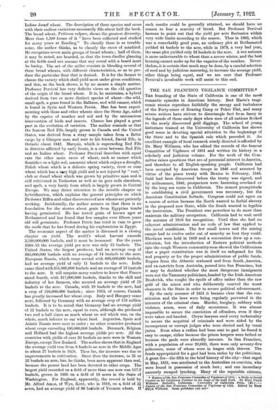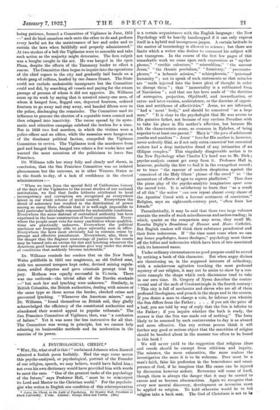THE SAN FRANCISCO VIGILANCE COMMITTEE.' THE founding of the State
of California is one of the most romantic episodes in American history. Bret Harte's tragi- comic stories reproduce faithfully the energy and turbulence of the Forty-niner of Roaring Camp or Poker Flat, and many severe writers have striven to disentangle fact from fancy in the legends of those early days when men of all nations flecked to the newly discovered gold diggings. The school of young historians trained at the University of California has shown good sense in devoting special attention to the beginnings of the State and to the Spanish rule which preceded it. An excellent example of local research wisely directed is afforded by Dr. Mary Williams, who has edited the records of the famous Committee of Vigilance of 1851 and written its history in a scholarly and judicious volume. For the work of the Com- mittee raises questions that are of perennial interest to America, and therefore to all English-speaking people. California had been occupied by American troops in 1846 and annexed by virtue of the peace treaty with Mexico in February, 1848. Gold had been discovered before the treaty was signed, and by midsummer, 1848, prospectors were hastening overland or by the long sea route to California. The utmost promptitude in establishing a civil government was necessary, but the American Constitution forbade. Congress could not agree on a course of action because the North wanted to forbid slavery in the proposed new State, while the South wanted to legalize the institution. The President was powerless to do more than maintain the military occupation. California had to wait until the autumn of 1850 for recognition. Until then she had no coherent administration and no code of law that applied to the-novel conditions. The few small towns and the mining camps had to evolve order out of anarchy as best they could. Elections were held in 1849 and a convention drew up a con- stitution, but the introduction of Eastern political methods into the rough Western community soon showed the Californians that a paper constitution was in itself no safeguard for life and property or for the proper administration of public funds. Rogues from the Atlantic seaboard and from South America, and ex-convicts from Australia, poured into San Francisco, but it may be doubted whether the most dangerous immigrants were not the Tammany politicians, headed by the Irish-American Broderick, who sought the spoils of office rather than the raw gold of the mines and who deliberately courted the worst elements in the State in order to secure political advancement.
By the early summer of 1851 it became clear that the con- stitution and the laws were being regularly perverted in the interests of the criminal class. Murder, burglary, robbery with violence, arson, were of daily occurrence. It was almost impossible to secure the conviction of offenders, even if they were taken red-handed. Cleyer lawyers used every technicality to secure the acquittal of criminals and wore aided by the incompetent or corrupt judges who were elected and, by venal juries. Even when a ruffian had been sent to gaol he found it easy to escape, either because the prison keepers were bribed or because the gaols were absurdly insecure. In San Francisco, with a population of over 20,000, there were only seventy-five policemen, some of whom were in league with thieves. The funds appropriated for a gaol had been stolen by the politicians. A great fire—the fifth in the brief history of the city—that raged in May, 1851, was attributed to the Australian ex-convicts, who were found in possession of much loot ; and one incendiary narrowly escaped lynching. Many of the reputable citizens, - • Siam/ of the San Francisco Committee of Vigilance of 1851: a Study of Social Control on the California Frontier in the Days of the Gold Rush. By Mary Floyd Williams. Berkeley, California University of California Press. f$5.1-- Payers of the San Francisco Committee of Vigilance of 1851. Edited by Mall Floyd Williams. 'Same publisher and nrlo•
losing patience, formed a Committee of Vigilance in June, 1851 —" and do bind ourselves each unto the other to do and perform every lawful act for the maintenance of law and order and to sustain the laws when faithfully and properly administered."
At two strokes of a bell the Vigilantes were to assemble and take such action as the majority might determine. The first culprit was a burglar caught in the act. He was hanged in the open Plaza, despite the efforts of the Tammany leader to effect a rescue. The Committee then began to inquire into the operations of the chief rogues in the city and gradually laid hands on a whole gang of ruffians, heeded by one James Stuart. The State could not exclude undesirable immigrants but the Committee could and did, by searching all vessels and paying for the return passage of persons of whom it did not approve. Dr. Williams sums up -its work by saying that it arrested ninety-one men, of whom it hanged four, flogged one, deported fourteen, ordered fourteen to go away and stay away, and handed fifteen over to the police, discharging the remainder. The Committee used its influence to procure the election of a reputable town council and then relapsed into inactivity. The terror spread by its syste- matic and relentless campaign subdued the lawless for a time. But in 1856 two foul murders, in which the victims were a police-officer and an editor, while the assassins were hangers-on of the dominant political faction, compelled the Vigilance Committee to revive. The Vigilantes took the murderers from gaol and hanged them, hanged two others a few weeks later and warned the more notorious of the politicians to leave San Francisco.
Dr. Williams tells her story fully and clearly and shows, in conclusion, that the San Francisco Committee was no isolated phenomenon but the outcome, as in other Western States or in the South to-day, of a lack of confidence in the elected administrators :-
" When we turn from the special field of Californian history of the days of the Vigilantes to the recent studies of our national institutions, we find that faults hitherto attributed to local . incompetency and corruption are recognized as everywhere latent in our whole scheme of social control. Everywhere the dread of autocracy has resulted in the distribution of power among so many State officials that it is well-nigh impossible to hold particular individuals responsible for undesirable conditions. Everywhere the same distrust of centralized authority has been expressed in the loose construction of local organization. Every- where the people must vote for many candidates whose qualifica- tions are practically unknown. Everywhere the political machines are frequently able to place unworthy men in office. Everywhere the laws most obviously fail to restrain crime by prompt and effective punishment. Everywhere, also, there is the danger that the flagrant miscarriage of justice in the courts may be turned into an excuse for riot and lynching whenever the American good humour and optimism give way under the strain of conditions that suddenly become intolerable."
Dr. Williams reminds her readers that on the New South Wales goldfields in 1851 one magistrate, an old Oxford man, with ten mounted troopers kept order, devised mining regula- tions, settled disputes and gave criminals prompt trial by jury. Hotham was equally successful in ViAoria. There was one outbreak—the trivial affair of the Eureka stockade
but mob law and lynching were unknown." Similarly, in British Columbia, the British authorities, dealing with miners of the same type as those across the border, checked crime and
prevented lynching. " Whenever the American miners," says
Dr. Williams, " found themselves on British soil, they gladly acknowledged the efficiency of the constituted authorities and abandoned their wonted appeal to popular tribunals." The San Francisco Committee of Vigilance, then, was " a confession of failure." Yet it was none the less instructive for all that.
The Committee was wrong in principle, but we cannot help admiring its businesslike methods and its moderation in the exercise of its power.











































 Previous page
Previous page